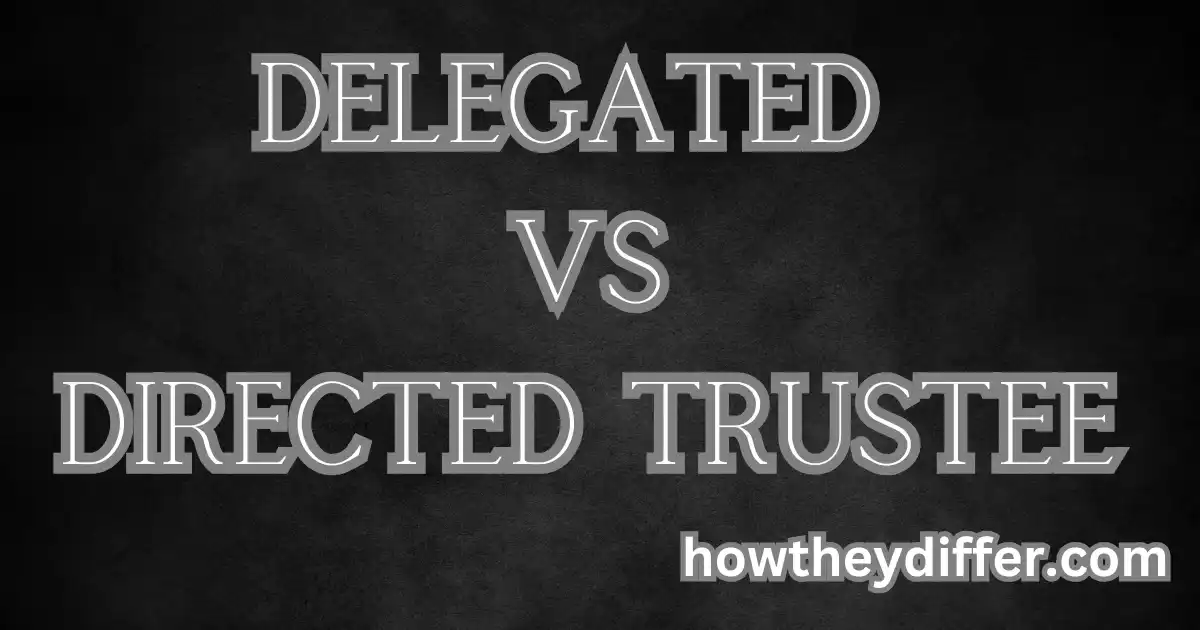You have valuable baseball cards you want to save for your younger sibling while you’re away at college. So, you ask your best friend to hold onto them. Your friend is like a trustee, someone you trust to take care of something important.
But what if you give your friend specific instructions on how to care for those cards? Or what if you let them decide what to do? This is similar to how delegated and directed trustees work.
Understanding these roles is important for managing trusts, where someone manages assets for others. Whether you’re planning for your family’s future or curious about trusts, this article will help you understand the difference between delegated and directed trustees.
What is a Trust?
Before we dive into the specifics, let’s understand what a trust is. A trust is like a special agreement where someone, called the grantor, gives property or assets to someone else, the trustee, to hold for the benefit of another person, the beneficiary.
Think of it like this: your parents give you money to buy groceries for the family. Your parents are the grantors, you are the trustee, and your family members are the beneficiaries.
What is a Trustee?
A trustee is the person or institution responsible for managing the assets held in a trust. They have a legal duty to act in the best interests of the beneficiaries. This means they must make careful decisions about how to invest, manage, and distribute the trust assets according to the grantor’s instructions.
Delegated Trustee: Sharing the Responsibility
A delegated trustee has the power to delegate, or hand off, certain tasks to other experts. This is like asking a friend to help organize your baseball card collection while still being ultimately responsible for their safekeeping.
- Flexibility: This allows the trustee to focus on their main duties while experts handle specialized tasks like investments or property management.
- Efficiency: Bringing in specialists can lead to better management of trust assets.
- Reduced Liability: In some cases, delegating can protect the trustee from personal liability for decisions made by the experts.
However, the delegated trustee still retains ultimate responsibility for the trust and must oversee the actions of the delegates.
Directed Trustee: Following Instructions
A directed trustee has limited decision-making power. They must follow specific instructions given by the grantor or another person, like an investment advisor. This is similar to giving your friend detailed instructions on how to store and care for your baseball cards.
- Control: The grantor or another designated person retains significant control over the management of trust assets.
- Expertise: Allows for specialized management by professionals chosen by the grantor.
- Potential Conflicts: Can sometimes lead to disagreements between the directed trustee and the person giving directions.
It’s important to note that a directed trustee is still responsible for ensuring the instructions they follow are legal and in the best interests of the beneficiaries.
Delegated And Directed Trustee: A Comparison
| Feature | Delegated Trustee | Directed Trustee |
|---|---|---|
| Decision-Making | Can delegate tasks and rely on expert advice | Must follow specific instructions |
| Control | Retains overall control but can share responsibilities | Limited control, follows directions |
| Flexibility | More flexible in managing trust assets | Less flexible, bound by instructions |
| Responsibility | Ultimately responsible for the trust and delegates | Responsible for following instructions and ensuring their legality |
Choosing the Right Trustee Structure
The choice between a delegated and directed trustee depends on the grantor’s wishes and the complexity of the trust. Factors to consider include:
- The nature of the trust assets: Are they complex investments requiring specialized management?
- The grantor’s desired level of control: Does the grantor want to maintain control or give the trustee more flexibility?
- The expertise of the trustee: Does the trustee have the necessary skills to manage all aspects of the trust?
Conclusion
Understanding the difference between delegated and directed trustees is essential for anyone involved in trust management.
Delegated trustees have the flexibility to delegate tasks while retaining overall control. Directed trustees follow specific instructions, offering the grantor more control but limiting the trustee’s decision-making power.
Choosing the right structure depends on the specific needs and goals of the trust.
FAQs
Some of the frequently inquired questions regarding the differences between delegated and directed trustees are as follow:
What happens if a trustee makes a mistake?
Trustees have a legal duty to act responsibly. If they make a mistake that harms the trust, they could be held liable for the losses. This means they might have to pay back money or compensate for the damage caused.
Can a beneficiary be a trustee?
Yes, a beneficiary can also be a trustee. This is sometimes used for simpler trusts or when a beneficiary has the skills to manage the assets. However, it can create potential conflicts of interest that need to be carefully managed to ensure fairness to all beneficiaries.
What is a trust protector?
A trust protector is like a safety net for the trust. It’s someone appointed by the grantor to oversee the trustee and ensure they are acting in the best interests of the beneficiaries. They have the power to remove or replace a trustee if needed.
Do all trusts need a trustee?
Yes, all trusts require a trustee to manage the assets and carry out the terms of the trust agreement. The trustee can be an individual, a professional trustee, or even a corporation.
Where can I find more information about trusts?
Trusts can be complex, and it’s always best to get professional advice. You can consult with an estate planning attorney or financial advisor for personalized advice about trusts and estate planning. They can help you understand your options and create a trust that meets your specific needs.
